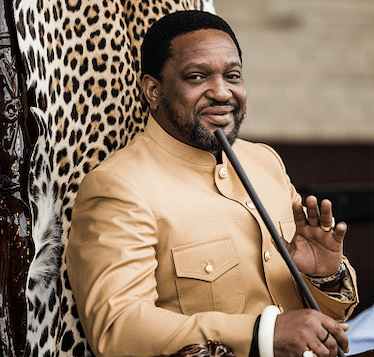
The monarch suspended members of the board and its executives over the December holiday period and appointed a legal firm to take over its running. (Rajesh Jantilal/Getty)
Parliament’s land reform portfolio committee wants to meet King MisuZulu ka Zwelithini to resolve the “crisis” caused by the breakdown in relations between him and the Ingonyama Trust Board (ITB).
The committee will also write to the king asking him to “hold back” on his attempt to suspend board members and executives — which he does not have the legal power to do — until after they meet at the end of this month.
The committee on Tuesday morning held an urgent meeting with the land reform and rural development minister, Mzwanele Nyhontso, to discuss the latest developments at the board, of which the king is the sole trustee and chairperson.
The monarch suspended members of the board and its executives over the December holiday period and appointed a legal firm, Van Rensburg Kruger Rakwena Attorneys to take over its running.
The minister intervened, reminding the king that he did not have the powers to fire board members, who were appointed and removed through a ministerial prerogative, and that the appointment of the lawyers to take over its running was unlawful.
Despite this the lawyers had continued to issue instructions on behalf of the king, while the ITB had been forced to close its offices last week in response to a planned march by amabutho (regiment) in support of the monarch.
Relations have soured between the king and the board over a number of issues, including his attempt to appoint the lawyers representing him in his succession battle to conduct an audit of ITB land.
The monarch’s lawyer, Stephen Rakwena, said last week that he had been appointed to investigate the sale of a farm at Umhlali by the ITB on the king’s instruction and accused its leadership of obstructing him.
The ITB administers nearly three million hectares of land in KwaZulu-Natal that falls under traditional authorities on the behalf of the king, who is the sole trustee of the Ingonyama Trust.
The entity is funded by Nyhontso’s department and is subject to the Public FInance Management Act.
It collects millions of rands annually from mines, commercial farms and other business operating on its land, which is meant to benefit the king, amakosi and communities under their leadership.
The board and executives were appointed by Nyhontso’s predecessor, Thoko Didiza, as part of a programme to regularise the finances and administration of the ITB, which had repeatedly failed to account to parliament under former chairperson Jerome Ngwenya’s tenure.
Nyhontso told the committee that he had requested a meeting when the king returned from a period of isolation in eSwatini on 15 January “to resolve the matter once and for all” but that the lawyers have continued “threatening people” and were causing “havoc” at the ITB’s office in Pietermartizburg.
“The king is keeping on writing letters through these lawyers, who we also state in our response that their appointment is irregular as a service provider can only be appointed by the board, and not the chairperson alone,” Nyhontso said.
“They keep on writing letters, threatening people, telling them they must not come to work. They are searching everyone coming into the office, creating havoc there,” he said.
While the committee and the minister want to avoid a public spat with the king “at all costs”, it has also acknowledged that he has acted beyond his powers in suspending board members and its executives and has backed Nyhontso’s intervention.
Nyhontso said that although he was of the view that relations between the king and the board had deteriorated to the point that they could not work together and he was prepared to dissolve it, he could not do so without legitimate reasons and without following proper process.
He said that at the time of his intervention, the board had been preparing to take the king to court.
“For now, the board remains in place. Once it is dissolved without proper reasons, chances are that a court is going to reinstate them with costs against us,” Nyhontso said.
Inquiry
He said he believed a three to five-month inquiry into the breakdown in relations and the allegations by both the board and the king should be held to come up with recommendations.
Committee members expressed concern about the “speed at which things are developing” and mandated chairperson Albert Mncwango to write to the king asking him to “hold back” until after their meeting.
Economic Freedom Fighters (EFF) MP Sam Matiase said things had reached a “crisis point” because the king “firmly believes that he has powers to dissolve the board, which is not true”.
“At the same time, we may not want to bring the monarchy into disrepute by engaging through the media with him and his office, each time contradicting him,” he said.
Matiase said contradicting the king “should be avoided by all means” but that the issues, including the alleged running of a parallel ITB administration from Saxonwold in Johannesburg by Ngwenya, had to be investigated and dealt with.
Mncwango said they should “avoid talking at cross purposes with the king” ahead of the meeting because this might “jeopardise” their opportunity of securing an audience with him to resolve the impasse.
Mncwango said the legal firm appointed by the king was inflaming tensions.
He described it as “the elephant in the room” and asked Nyhontso to intervene because they were having a “very concerning influence on the goings on in this crisis as they are not being helpful at all”.
The meeting agreed that it would also request reports from all stakeholders within seven days and would review previous presentations and reports on the ITB ahead of its visit to KwaZulu-Natal at the end of the month.



